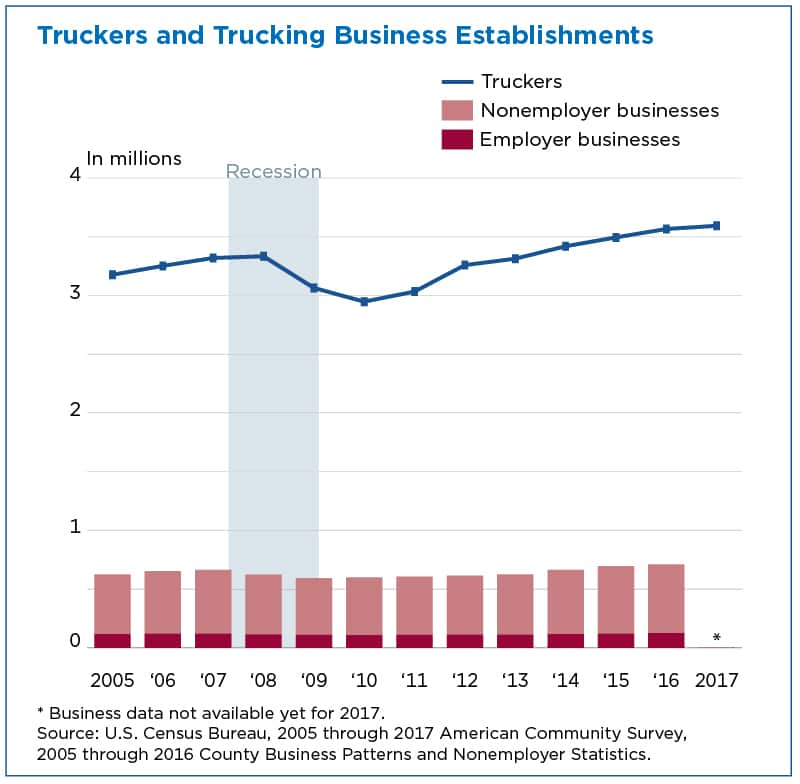Before we know if trucking companies can survive a freight recession, let’s break down the different types of freight carriers that commonly operate in the US.
Trucking companies, also known as ‘motor carriers’ are responsible for transporting large amounts of goods over land from one place to another. As the name suggests, trucks (aka power units) are used as a mode of transportation for consumer, commercial, and government goods.
Types of Carriers:
- Local Carriers
- Regional Carriers
- National Carriers
Importance of the Trucking Industry in the USA?

In 2021, around 72% of all freight transported in the United States was done via trucks. In fact, according to the U.S. Freight Transportation Forecast for 2022 by the American Trucking Association (ATA), freight tonnage in the U.S. is projected to grow 24% by the end of 2022, and the industry’s revenue is expected to grow by 66%.
ATA reported industry earnings of $732.3 billion in gross freight revenues (primary shipments only) in the trucking industry, representing 80.4% of the nation’s freight bill in 2020. In fact, around 7.65 million people were employed across the economy in jobs related to trucking activity in 2020, excluding the self-employed.
The truck industry is one of the most important industries in any country that highly contributes to the GDP. No matter whether the business is small or large, almost every business in the world needs to transport goods quickly, safely, and efficiently from one place to another.
The trucking industry handles goods and cargo way more than any other mode of transportation, such as ships, planes, or trains. Not to forget, if it wasn’t for trucks, the cargo could not be transported from ports and airports to their ultimate delivery destination.
What Types of Goods Does the Trucking Industry Manage?
The list of goods that the trucking industry manages is quite long, but let’s list some just to give you a headstart.
Trucks are used to transport raw materials from local suppliers to manufacturers. For instance, trucks can transport raw material from a farm to a factory where this raw material can be processed to prepare a finished product.
Moreover, trucks can transport the finished product to the various wholesalers/retailers.
Employment Opportunities
The trucking industry helps a lot of people to get employment opportunities. According to ATA, 3.36 million truck drivers were employed in 2020 (a decrease of 6.8% from 2019).
On average, 231,000 openings for heavy truck drivers are projected to become available per year.
Political Impact
The trucking industry generates a significant amount of revenue each year. Due to the high importance of the trucking companies and the trucking industry, both federal and state-level governments are interested in improving regulations. For instance, creating laws that disallow trucks from using certain roads to ensure public safety, mandated integrations with monitoring software, and more focus on prioritizing safer vehicles.
Impact of High Diesel Prices on the Trucking Industry

Every industry, no matter which sector it belongs to, faces challenges related to freight movement. But the real question is, can trucking companies survive a freight recession?
Fortunately, a little relief in the form of diesel prices is that diesel prices have reduced from $5.81 per gallon to around $4.993 per gallon. Although the diesel price has decreased, a further decrease in diesel price is required for the trucking industry to perform optimally.

The people most vulnerable to such increased operational costs are the ones operating in small trucking companies. At the moment, small trucking companies don’t have much leverage to negotiate fuel costs with shippers considering the low freight volume plaguing companies around the nation. Fuel cards, newer trucks, and driver education are the best solutions for optimizing fuel consumption at the moment.
How Trucking Companies Can Survive a Freight Recession
For trucking companies to survive the volatile landscape, it’s essential for companies to stay on top of expenses and continue looking for ways to optimize their operations. Reducing operational costs, combined with increasing profit margins and revenues, is the best hope for companies that plan on getting through the turmoil.
Diversifying Distribution Network
Diversifying from a single distribution site into multiple sites can significantly reduce the distance, fuel consumption and cost, and transportation time. Minimizing empty miles and reducing idle times can help manage fuel costs as well.
Improving Vehicle Efficiency
A well-maintained truck will operate at optimal efficiency. In many cases, poor vehicle maintenance and vehicles staying in service beyond their recommended max mileage is a major causes for high operational costs.
Also, various other factors contribute to efficient fuel consumption, such as speed. For example, driving over 55 mph increases diesel consumption. For every one-mile-per-hour increase in speed, the fuel economy is reduced by ~0.1 mpg. This adds up when taking into account that the average driver will travel between 80,000-110,000 miles per year.
Ways to Improve Fuel Efficiency
Optimization
Trucking companies should prioritize load optimization across operations. Load sequencing and space usage are also great ways to get the most efficiency per dollar spent.
Like any other business, acquiring new customers is essential for trucking companies. If companies were to have customer acquisition systems in place, it would put them in a better position to negotiate freight prices and sequence loads in the most efficient manner possible. In this digital era, online marketing is one of the best tools for acquiring the right customers. Word of mouth is still the best acquisition channel, which is why companies should focus on driver satisfaction, broker relationships, phone support training programs for dispatchers and sales staff etc.
What Would Happen if the Trucking Industry Came to a Stop?
It’s no surprise that the country’s economy would come to a screeching halt if the logistics supply chains were to be stopped. Even a few days of limited movement would lead to serious problems for nearly everyone living in the modern world.
There would be massive price increases in goods as the sellers try to meet consumer demands with limited supply. Medical hospitals would cease to function due to the unavailability of medical supplies. Gas stations would eventually run out of fuel leading to a cascade of problems for citizens and businesses.
Conclusion
If we consider the Great Recession, almost 900 carriers shut down their operations in each of the first two quarters of the year. But, the speed of failures slowed down in the third quarter as fuel prices started decreasing due to the effects of the recession.

In a nutshell, given the indispensable role trucking companies play in all industries, we can assume that trucking companies can survive a freight recession so long as they are prioritizing the right operational processes.


